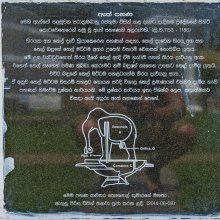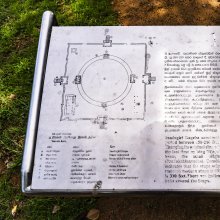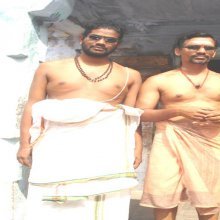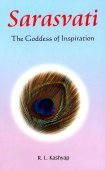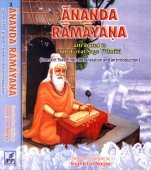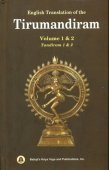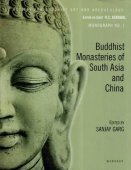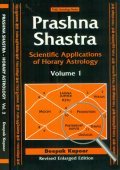Usa, Uṣā, Usā, Ūsa, Usha, Uṣa, Ūṣā, Ūṣa: 29 definitions
Introduction:
Usa means something in Hinduism, Sanskrit, Jainism, Prakrit, Buddhism, Pali, Marathi, Hindi, biology. If you want to know the exact meaning, history, etymology or English translation of this term then check out the descriptions on this page. Add your comment or reference to a book if you want to contribute to this summary article.
The Sanskrit terms Uṣā and Uṣa and Ūṣā and Ūṣa can be transliterated into English as Usa or Usha, using the IAST transliteration scheme (?).
Images (photo gallery)
(+1 more images available)
In Hinduism
Shilpashastra (iconography)
Source: Wisdom Library: Elements of Hindu IconograpyUṣā (उषा):—The consort of Śarva (aspect of Śiva, as in, one of the eight names of Rudra) according to the Pādma-purāṇa.
Source: Shodhganga: Elements of Art and Architecture in the Trtiyakhanda of the Visnudharmottarapurana (shilpa)Uṣā (उषा) or “dawn” follows specific guidelines of ancient Indian Painting (citra), according to the Viṣṇudharmottarapurāṇa, an ancient Sanskrit text which (being encyclopedic in nature) deals with a variety of cultural topics such as arts, architecture, music, grammar and astronomy.—In the Viṣṇudharmottarapurāṇa, the rules of Painting of different classes have been elaborately discussed. The time of uṣā i.e., dawn when the sun is about to rise. It seems to be a beautiful source of Painting. In the Viṣṇudharmottarapurāṇa, the picture of this time is associated with the rising of the sun, dim lamps and cocks in crying mood. In the Vedic period, some natural objects and phenomena were associated with the form of deities. The time of dawn is also portrayed as the Goddess Uṣā in the Ṛgveda and it is said that, in the beginning of the day, the mighty Sun sends goddess Uṣā and after that the Sun god enters into the earth and heaven.

Shilpashastra (शिल्पशास्त्र, śilpaśāstra) represents the ancient Indian science (shastra) of creative arts (shilpa) such as sculpture, iconography and painting. Closely related to Vastushastra (architecture), they often share the same literature.
Purana and Itihasa (epic history)
Source: Wisdom Library: The Matsya-purāṇaUṣā (उषा) is the name of a mind-born ‘divine mother’ (mātṛ), created for the purpose of drinking the blood of the Andhaka demons, according to the Matsya-purāṇa 179.8. The Andhaka demons spawned out of every drop of blood spilled from the original Andhakāsura (Andhaka-demon). According to the Matsya-purāṇa 179.35, “Most terrible they (e.g., Uṣā) all drank the blood of those Andhakas and become exceedingly satiated.”
The Matsyapurāṇa is categorised as a Mahāpurāṇa, and was originally composed of 20,000 metrical verses, dating from the 1st-millennium BCE. The narrator is Matsya, one of the ten major avatars of Viṣṇu.
Source: archive.org: Puranic Encyclopedia1) Uṣā (उषा).—The daughter of Bāṇāsura and the wife of Aniruddha. Genealogy. Descended from Viṣṇu in the following order:—Brahmā-Kaśyapa-Hiraṇyakaśipu-Prahlāda-Virocana-Mahābali-Bāṇa-Uṣā. Marriage of Uṣā. See under Aniruddha. (See full article at Story of Uṣā from the Puranic encyclopaedia by Vettam Mani)
2) Uṣā (उषा).—The daughter of a hermit. The king of Śālva once attacked Satyaratha, the king of Vidarbha, and killed him. The queens of the king of Vidarbha went to the forest. One of them who was pregnant gave birth to a child on the bank of a river. When she got down into the river to drink water, a crocodile swallowed her. Then a hermit’s daughter named Uṣā brought up the child. (Śiva Purāṇa).
3) Uṣā (उषा).—The night is called Uṣā and the day, Ghuṣṭi. The time between Uṣā and Ghuṣṭi is called Sandhyā. (Viṣṇu Purāṇa, Aṃ a 2, Chapter 8).
Source: archive.org: Shiva Purana - English TranslationUṣā (उषा) refers to the last yāma (3 hours) of the night, as defined in the Śivapurāṇa 1.13, “The last yāma (3 hours) of the night is called uṣā and the latter half of it is sandhi (period of conjunction). A Brahmin shall get up at that hour and answer the calls of nature. It must be in a place far off from the house. It must be a covered place. He shall sit facing the north. If it is not possible due to any obstacle he can sit facing other directions”.
Source: Cologne Digital Sanskrit Dictionaries: The Purana Index1a) Uṣa (उष).—The wife of Vibhāvasu; mother of Vyuṣṭa and two other sons.*
- * Bhāgavata-purāṇa VI. 6. 16.
1b) Night: a mind-born mother.*
- * Matsya-purāṇa 179. 20; Vāyu-purāṇa 50. 161.
1c) Created by Brahmā from his feet;1 camels belonging to the Tāmra line.2
2) Uṣā (उषा).—The daughter of Bāṇa and granddaughter of Bali got enamoured of Aniruddha whom she saw in a picture and requested her maid to arrange for her marriage with him; she saw Umā dallying with Śiva and asked of her marriage which Umā said will be to him whom she would see in a dream. So she saw Aniruddha in a dream on a vaiśākha śukla dvādaśī; by the aid of Citralekhā, he was taken to her chamber in secret. Also ūṣā (s.v.).*
- * Viṣṇu-purāṇa V. 32. 7-30.
3) Ūṣā (ऊषा).—(also uṣā) Daughter of Bāṇa. Her companion was Citralekhā. Dreamt one night that she was sleeping with Aniruddha. Informed her friend of the dream but could not give Aniruddha's name. Citralekhā drew pencil sketches of all gods and men and showed them to her one by one. Seeing Aniruddha's she identified him. At this, Citralekhā flew through air and brought Aniruddha to her room unnoticed by others. Ūṣā was enjoying his company. The guards who got scent of this reported to Bāṇa who imprisoned Aniruddha. In course of time she married Aniruddha and went to his home with the approval of Bāṇa.*
- * Bhāgavata-purāṇa X. 61. 23 [9]; 62. 1-35; 63. 50.

The Purana (पुराण, purāṇas) refers to Sanskrit literature preserving ancient India’s vast cultural history, including historical legends, religious ceremonies, various arts and sciences. The eighteen mahapuranas total over 400,000 shlokas (metrical couplets) and date to at least several centuries BCE.
Kavya (poetry)
Source: Wisdom Library: KathāsaritsāgaraUṣā (उषा) is the daughter of Asura Bāṇa, who had Citralekhā paint her a picture of her unknown lover Aniruddha, according to the Kathāsaritsāgara, chapter 31. Accordingly, “and Citralekhā, being acquainted with magic, thus addressed that Uṣā, who knew not the name of her lover nor any sign whereby to recognise him: ‘My friend, this is the result of the boon of the goddess Gaurī. What doubt can we allege in this matter? But how are you to search for your lover, as he is not to be recognised by any token? I will sketch for you the whole world, gods, Asuras and men, in case you may be able to recognise him; and point him out to me among them in order that I may bring him’.”.
The story of Uṣā, Bāṇa and Citralekhā was narrated by Kaliṅgasenā to Somaprabhā in order to demonstrate the similarity between the story and her situation involving the Udayana (king of Vatsa).
The Kathāsaritsāgara (‘ocean of streams of story’), mentioning Uṣā, is a famous Sanskrit epic story revolving around prince Naravāhanadatta and his quest to become the emperor of the vidyādharas (celestial beings). The work is said to have been an adaptation of Guṇāḍhya’s Bṛhatkathā consisting of 100,000 verses, which in turn is part of a larger work containing 700,000 verses.

Kavya (काव्य, kavya) refers to Sanskrit poetry, a popular ancient Indian tradition of literature. There have been many Sanskrit poets over the ages, hailing from ancient India and beyond. This topic includes mahakavya, or ‘epic poetry’ and natya, or ‘dramatic poetry’.
Ayurveda (science of life)
Source: gurumukhi.ru: Ayurveda glossary of termsŪṣā (ऊषा):—Burning sensation with restlessness

Āyurveda (आयुर्वेद, ayurveda) is a branch of Indian science dealing with medicine, herbalism, taxology, anatomy, surgery, alchemy and related topics. Traditional practice of Āyurveda in ancient India dates back to at least the first millenium BC. Literature is commonly written in Sanskrit using various poetic metres.
Shaktism (Shakta philosophy)
Source: Google Books: ManthanabhairavatantramUṣā (उषा) refers to the “dawn”, according to the Ṭīkā (commentary) on the Manthānabhairavatantra, a vast sprawling work that belongs to a corpus of Tantric texts concerned with the worship of the goddess Kubjikā.—Accordingly, “[...] Śiva, that is, Śrīnātha has entered the four sacred seats (i.e., Oḍḍiyāṇa, Jālandhara, Pūrṇagiri and Kāmarūpa) along with Umā, the goddess. [...] Thus that Siddha has attained repose in knowledge. He has acquired knowledge and is famous in the world. His body has come down into the Lineage of the Youngest. Who is he? He is said to be the sun, the husband of the dawn (uṣā-pati). The other name he has assumed is Mitra and so (this Siddha) is called Mitrīśa. [...]”.

Shakta (शाक्त, śākta) or Shaktism (śāktism) represents a tradition of Hinduism where the Goddess (Devi) is revered and worshipped. Shakta literature includes a range of scriptures, including various Agamas and Tantras, although its roots may be traced back to the Vedas.
General definition (in Hinduism)
Source: Apam Napat: Indian MythologyUsha is the Vedic Goddess of Dawn. She is said to be the daughter of sky [R.V.1.48]. She is radiant, immortal. The twin Ashwinis are her companions and follow her in their glorious chariot. She is one of the few Goddesses mentioned in the Rig Veda.
Source: WikiPedia: HinduismUshā (उषा): Wife of Aniruddha, daughter of Banasur.
In Jainism
General definition (in Jainism)
Source: archive.org: Economic Life In Ancient India (as depicted in Jain canonical literature)Uṣa (उष) refers to “soda”: a mineral that was typically mined, extracted and used (both domestic and industrial) in ancient India. Mining was an important industry at that time as well. The Jaina canonical texts mention about the extraction of various kinds of minerals, metals and precious stones. The term ‘āgara’ occurring intire texts denotes the mines which provided many kinds of mineral products (e.g., uṣa). The references in the texts of various professions and trade in metallic commodities clearly show a highly developed industry of mining and metallurgy in that period.

Jainism is an Indian religion of Dharma whose doctrine revolves around harmlessness (ahimsa) towards every living being. The two major branches (Digambara and Svetambara) of Jainism stimulate self-control (or, shramana, ‘self-reliance’) and spiritual development through a path of peace for the soul to progess to the ultimate goal.
Biology (plants and animals)
Source: Google Books: CRC World Dictionary (Regional names)Usa in India is the name of a plant defined with Saccharum officinarum in various botanical sources. This page contains potential references in Ayurveda, modern medicine, and other folk traditions or local practices It has the synonym Saccharum atrorubens Cuzent & Pancher ex Drake (among others).
Example references for further research on medicinal uses or toxicity (see latin names for full list):
· Acta Literaria Universitatis Hafniensis (1778)
· Öfversigt af Förhandlingar: Kongl. Svenska VetenskapsAkademien (1855)
· Adnotationes Botanicae (1829)
· J. Fujian Acad. Agric. Sci. (1996)
· Caryologia (1984)
· Plantae Javanicae Rariores (1848)
If you are looking for specific details regarding Usa, for example chemical composition, side effects, health benefits, pregnancy safety, diet and recipes, extract dosage, have a look at these references.

This sections includes definitions from the five kingdoms of living things: Animals, Plants, Fungi, Protists and Monera. It will include both the official binomial nomenclature (scientific names usually in Latin) as well as regional spellings and variants.
Languages of India and abroad
Pali-English dictionary
Source: BuddhaSasana: Concise Pali-English Dictionaryūsa : (m.) saline substance.
Source: Sutta: The Pali Text Society's Pali-English DictionaryUsā, (f.) (doubtful) (a certain) food J. VI, 80. (Page 156)
— or —
Ūsa, (Sk. ūṣa) salt-ground; saline substance, always combd. with khāra S III 131 (°gandha); A. I, 209. (Page 159)

Pali is the language of the Tipiṭaka, which is the sacred canon of Theravāda Buddhism and contains much of the Buddha’s speech. Closeley related to Sanskrit, both languages are used interchangeably between religions.
Marathi-English dictionary
Source: DDSA: The Molesworth Marathi and English Dictionaryusa (उस).—An interjection upon a sudden pang or twinge. v mhaṇa, kara. See hāya.
Source: DDSA: The Aryabhusan school dictionary, Marathi-Englishūsa (ऊस).—m Sugarcane.
Marathi is an Indo-European language having over 70 million native speakers people in (predominantly) Maharashtra India. Marathi, like many other Indo-Aryan languages, evolved from early forms of Prakrit, which itself is a subset of Sanskrit, one of the most ancient languages of the world.
Sanskrit dictionary
Source: DDSA: The practical Sanskrit-English dictionaryUṣa (उष).—a. Burning.
-ṣaḥ 1 Early morning, dawn, daybreak.
2) A libidinous man,
3) Saline earth.
4) Bdellium.
--- OR ---
Uṣā (उषा).—[oṣatyandhakāram uṣ-ka]
1) Early morning, dawn; उषामुषां श्रेयसीं धेह्यस्मै (uṣāmuṣāṃ śreyasīṃ dhehyasmai) Av.12.2.45.
2) Morning light.
3) Twilight.
4) Saline earth.
5) A cow.
6) Night.
7) A boiler, cooking vessel (sthālī); cf. उखा (ukhā).
8) Name of a wife of Bhava (who was a manifestation of Rudra).
9) Name of a daughter of the demon Bāṇa and wife of Aniruddha. [She beheld Aniruddha in a dream and became passionately enamoured of him. She sought the assistance of her friend Chitralekhā, who advised her to have with her the portraits of all young princes living round about her. When this was done, she recognized Aniruddha and had him carried to her city, where she was married to him; see अनिरुद्ध (aniruddha) also]. ind. Early in the morning.
2) At night.
--- OR ---
Ūṣa (ऊष).—[ūṣ-rujāyām-ka]
1) Salt ground; saline earth; कौशेयाविकयोरूषैः (kauśeyāvikayorūṣaiḥ) (śaucaṃ vidhīyate) Manusmṛti 5.12.
2) An acid.
3) A cleft, fissure.
4) The cavity of the ear.
5) The Malaya mountain.
6) Dawn, daybreak (-ṣam according to some).
7) Semen.
-ṣī Saline earth; भस्मन्हुतं कुहकराद्धमिवोप्तमूष्याम् (bhasmanhutaṃ kuhakarāddhamivoptamūṣyām) Bhāgavata 1.15.21.
Derivable forms: ūṣaḥ (ऊषः).
--- OR ---
Ūṣā (ऊषा).—= उषा (uṣā) q. v.
Source: Cologne Digital Sanskrit Dictionaries: Shabda-Sagara Sanskrit-English DictionaryUṣa (उष).—m.
(-ṣaḥ) 1. Early morning, dawn, day-break. 2. A libidinous man. 3. Bdellium. 4. Saline earth. f.
(-ṣā) 1. A cow. 2. Burning, scorching. 3. A proper name, the wife of Anirudd'Ha. 4. Night. 5. A pot; also ukhā. ind. The end of night or day-break. E. uṣ to burn, ka affix and fem. do ṭāp; the affix of the particle is kā.
--- OR ---
Ūṣa (ऊष).—m.
(-ṣaḥ) Salt-ground, soil impregnated with saline particles. n.
(-ṣaṃ) Dawn, day-break. f.
(-ṣā) The wife of Anirudd'Ha. E. ūṣ to be or make sick, ka affix, fem. ṭāp: see uṣā.
Source: Cologne Digital Sanskrit Dictionaries: Benfey Sanskrit-English DictionaryŪṣa (ऊष).—I. m. Saline earth, [Mānavadharmaśāstra] 5, 120. Ii. f. ṣī, Salt ground, [Bhāgavata-Purāṇa, (ed. Burnouf.)] 1, 15, 21.
Source: Cologne Digital Sanskrit Dictionaries: Cappeller Sanskrit-English DictionaryUṣa (उष).—[adjective] desirous, eager.
--- OR ---
Uṣā (उषा).—[feminine] dawn, morning.
--- OR ---
Ūṣa (ऊष).—[masculine] ūṣā & ī [feminine] alkaline earth.
Source: Cologne Digital Sanskrit Dictionaries: Monier-Williams Sanskrit-English Dictionary1) Uṣa (उष):—[from uṣ] 1. uṣa m. (for 2. See sub voce) early morning, dawn, daybreak, [cf. Lexicographers, esp. such as amarasiṃha, halāyudha, hemacandra, etc.]
2) [v.s. ...] bdellium
3) [v.s. ...] saline earth, [cf. Lexicographers, esp. such as amarasiṃha, halāyudha, hemacandra, etc.]
4) Uṣā (उषा):—[from uṣa > uṣ] a f. See below
5) Uṣa (उष):—[from uṣ] n. fossile salt, [cf. Lexicographers, esp. such as amarasiṃha, halāyudha, hemacandra, etc.] (cf. ūṣa.)
6) Uṣā (उषा):—[from uṣ] b f. morning light, dawn, morning, [Ṛg-veda; Atharva-veda xii, 2, 45; Vājasaneyi-saṃhitā] etc.
7) [v.s. ...] night, [Viṣṇu-purāṇa; Caraka]
8) [v.s. ...] a cow, [cf. Lexicographers, esp. such as amarasiṃha, halāyudha, hemacandra, etc.]
9) [v.s. ...] Name of a daughter of Bāṇa and wife of A-niruddha, [Agni-purāṇa]
10) [v.s. ...] burning, scorching, [Suśruta]
11) [v.s. ...] ind. at daybreak, [cf. Lexicographers, esp. such as amarasiṃha, halāyudha, hemacandra, etc.]
12) [v.s. ...] at night, [cf. Lexicographers, esp. such as amarasiṃha, halāyudha, hemacandra, etc.]
13) Uṣa (उष):—2. uṣa (for 1. See [column]1) m. (probably for uśa, [from] √vaś; cf. uśa-dah), a lover, [cf. Lexicographers, esp. such as amarasiṃha, halāyudha, hemacandra, etc.]
14) Ūṣa (ऊष):—m. (√uṣ, [Boehtlingk & Roth’s Sanskrit-Woerterbuch]; √ūṣ, [Tārānātha tarkavācaspati’s Vācaspatyam, Sanskrit dictionary]), salt ground, soil impregnated with saline particles, [Taittirīya-saṃhitā; Aitareya-brāhmaṇa iv, 27, 9; Śatapatha-brāhmaṇa; Manu-smṛti v, 120; Suśruta] etc. (according to the Brāhmaṇas also ‘cattle’)
15) a cleft, hole, [cf. Lexicographers, esp. such as amarasiṃha, halāyudha, hemacandra, etc.]
16) the cavity of the ear, [cf. Lexicographers, esp. such as amarasiṃha, halāyudha, hemacandra, etc.]
17) the Malaya mountain, [cf. Lexicographers, esp. such as amarasiṃha, halāyudha, hemacandra, etc.]
18) dawn, daybreak, [cf. Lexicographers, esp. such as amarasiṃha, halāyudha, hemacandra, etc.] (in the latter sense also n., [Horace H. Wilson])
19) f(ā and ī). soil impregnated with saline particles, sterile soil, [Kātyāyana-śrauta-sūtra; Bhāgavata-purāṇa]
20) Ūṣā (ऊषा):—[from ūṣa] f. Name of a daughter of Bāṇa and wife of Aniruddha ([varia lectio] uṣā q.v.)
21) Uṣa (उष):—[from vas] a See under √1 uṣ
Source: Cologne Digital Sanskrit Dictionaries: Yates Sanskrit-English Dictionary1) Uṣa (उष):—(ṣaḥ) 1. m. Early morning; a libertine; saline earth. (ṣā) f. Night; a cow; a pot; burning.
2) Ūṣa (ऊष):—(ṣaḥ) 1. m. Salt ground. n. Dawn. f. Wife of Aniruddha.
Source: DDSA: Paia-sadda-mahannavo; a comprehensive Prakrit Hindi dictionary (S)Ūṣa (ऊष) in the Sanskrit language is related to the Prakrit word: Ūsa.
[Sanskrit to German]
Sanskrit, also spelled संस्कृतम् (saṃskṛtam), is an ancient language of India commonly seen as the grandmother of the Indo-European language family (even English!). Closely allied with Prakrit and Pali, Sanskrit is more exhaustive in both grammar and terms and has the most extensive collection of literature in the world, greatly surpassing its sister-languages Greek and Latin.
Hindi dictionary
Source: DDSA: A practical Hindi-English dictionary1) Uṣā (उषा):—(nf) the dawn.
2) Usa (उस) [Also spelled us]:—(pro) oblique singular form of [vaha; use/~ko] to him.
...
Prakrit-English dictionary
Source: DDSA: Paia-sadda-mahannavo; a comprehensive Prakrit Hindi dictionary1) Usā (उसा) in the Prakrit language is related to the Sanskrit word: Uṣas.
2) Ūsa (ऊस) also relates to the Sanskrit word: Ustra.
3) Ūsa (ऊस) also relates to the Sanskrit word: Ūṣa.
Prakrit is an ancient language closely associated with both Pali and Sanskrit. Jain literature is often composed in this language or sub-dialects, such as the Agamas and their commentaries which are written in Ardhamagadhi and Maharashtri Prakrit. The earliest extant texts can be dated to as early as the 4th century BCE although core portions might be older.
Kannada-English dictionary
Source: Alar: Kannada-English corpusUṣa (ಉಷ):—
1) [noun] the time in the morning when daylight first appears or just before that; day-break.
2) [noun] the light first appeared just before the sunrise.
--- OR ---
Ūṣa (ಊಷ):—[noun] salty soil; salt ground.
Kannada is a Dravidian language (as opposed to the Indo-European language family) mainly spoken in the southwestern region of India.
See also (Relevant definitions)
Starts with (+164): Ucakam, Ucakkaiyar, Ucal, Ucalattam, Ucalattu, Ucalatu, Ucali, Ucalvari, Ucam, Ucanan, Ucanar, Ucar, Ucar-payarrukari, Ucaritam, Ucarkalam, Ucarparuvam, Ucatal, Ucatevi, Ucattunai, Ucatu.
Ends with (+1087): Aba-musa, Abanusa, Abhusha, Abhyupetyashrusha, Abhyupetyashushrusha, Abhyusha, Acakkhusa, Acakshusha, Acaryapurusha, Accankusa, Acronychia retusa, Adabajusa, Adamusa, Addhapurusha, Adeshapurusha, Adhamapurusha, Adhikarapurusha, Adhipaurusha, Adhipurusha, Adhrusha.
Full-text (+238): Ushas, Ushakala, Ushapati, Ushara, Usharamana, Citralekha, Usar, Ushahkala, Abhyusha, Aushasa, Ushah, Ushakkalam, Us, Vanasuta, Banasuta, Ushavat, Ushacarita, Ushanidana, Ushesha, Ushaharana.
Relevant text
Search found 99 books and stories containing Usa, Uṣā, Usā, Ūsa, Usha, Uṣa, Ūṣā, Ūṣa, Ushaa; (plurals include: Usas, Uṣās, Usās, Ūsas, Ushas, Uṣas, Ūṣās, Ūṣas, Ushaas). You can also click to the full overview containing English textual excerpts. Below are direct links for the most relevant articles:
Women in the Atharva-veda Samhita (by Pranab Jyoti Kalita)
25. Goddess Uṣas < [Chapter 4 - Female Deities and the Glorification of Women in the Atharvaveda]
19. Goddess Rātri < [Chapter 4 - Female Deities and the Glorification of Women in the Atharvaveda]
8. Goddess Ekāṣṭakā < [Chapter 4 - Female Deities and the Glorification of Women in the Atharvaveda]
Rig Veda (translation and commentary) (by H. H. Wilson)
The Vishnu Purana (by Horace Hayman Wilson)
Chapter XXXII - Description of Usha the daughter of Bana < [Book V]
Chapter VIII - Origin of Rudra: his becoming eight Rudras < [Book I]
Chapter XXXIII - Battle of Krishna and demon Bana < [Book V]
Lord Hayagriva in Sanskrit Literature (by Anindita Adhikari)
Saṃhitā (1): Divine steed in the Ṛgveda < [Chapter 2]
Brāhmaṇa (1): Aśvamedha or Horse sacrifice < [Chapter 2]
Trishashti Shalaka Purusha Caritra (by Helen M. Johnson)
Chapter VIII - The episode of Sāgaracandra < [Book VIII - Nemināthacaritra (Jain Harivamsa)]
Part 4: Kidnapping of Uṣā < [Chapter VIII - The episode of Sāgaracandra]
Part 5: Killing of Bāṇa < [Chapter VIII - The episode of Sāgaracandra]
Chaitanya Bhagavata (by Bhumipati Dāsa)
Verse 2.1.250 < [Chapter 1 - The Beginning of the Lord’s Manifestation and His Instructions on Kṛṣṇa-saṅkīrtana]
Verse 2.1.52 < [Chapter 1 - The Beginning of the Lord’s Manifestation and His Instructions on Kṛṣṇa-saṅkīrtana]
Verse 2.1.141 < [Chapter 1 - The Beginning of the Lord’s Manifestation and His Instructions on Kṛṣṇa-saṅkīrtana]
Related products
(+1 more products available)
